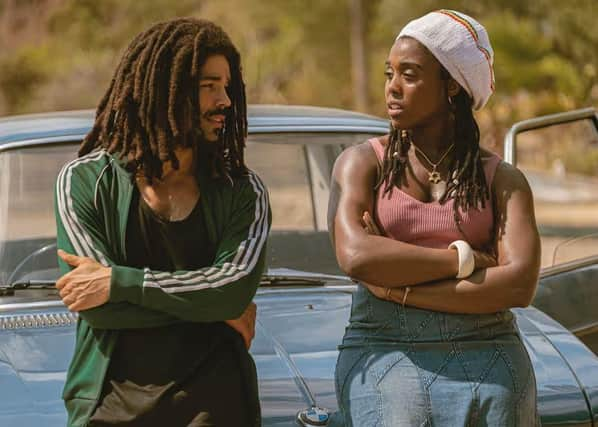REVIEW: Bob Marley biopic leaves too many questions unanswered


It’s a genuinely mesmerising performance from Kingsley Ben-Adir as the man himself in Bob Marley: One Love. But the film’s greatest virtue might just be the fact that it so eloquently gives context to Marley’s songs. Even so, it’s a film which will leave you wishing you knew so much more – even at the end. We were fortunate to pick completely accidentally a sub-titled performance – and that certainly helped with a patois you might otherwise struggle to attune to. It also offered the chance to contemplate the brilliance of the lyrics – all expressions of music with a cause, music which was never about the money, but always about the search for justice, freedom and peace.
The film begins in 1976 against a background of unrest and division across Jamaica with the island slipping towards civil war – a moment at which Marley himself was so nearly one of the victims, narrowly escaping an assassination attempt.
Advertisement
Hide AdAdvertisement
Hide AdHe is dreaming of a unifying concert to bring the people together but judges that the time just isn’t right. Instead he heads off to punk London where he writes and records the landmark Exodus. He tours Europe, he becomes a superstar and he struggles will all that goes with it, from a booker ripping him off to an almost inevitable distancing from his wife, beautifully played by Lashana Lynch, whom we saw all those years ago on the Minerva stage in Chichester opposite Lenny Henry in Educating Rita.
It's also in Europe that Marley is forced, most reluctantly, to face up to the start of the illness which was to kill him just a few years later at the tragically young age of 36. For the moment, though, the illness means a return to Jamaica for the One Love peace concert.
The vocals in the film are Marley’s own, but you hardly see the join as Kingsley Ben-Adir brings the songs memorably to life, both in the studio and on stage. And the subtitles were a great way finally to see what these songs – almost all so familiar – were so importantly saying.
Even so, it’s not quite enough. If you get the chance, mug up on the beliefs and principles of Rastafari before seeing this film – because the film itself isn’t overly concerned to explain anything terribly much. There is a great sense of the era and indeed ultimately a great sense of Marley’s importance – but what difference his concert actually made isn’t explored. It would have been good to know so much more. Similarly left hanging are the intimations of his childhood trauma, with rings of fire closing in on him somehow paralleled by a ring he is offered later in life. If there are dots to be joined here, and surely there are, the film doesn’t quite offer enough for us to join them with any confidence. But maybe that’s far better than a movie which ends up heavy-handed. The fact is that it’s a starting point for rethinking Marley, and if it’s up to us to do the rest, then maybe that’s no bad thing. The songs remain, especially the sublime Redemption Song. So too do the performances of Ben-Adir and Lashana Lynch.